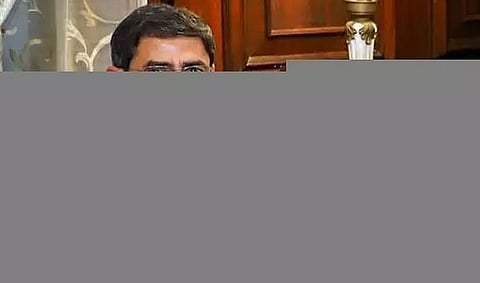
- Home
- Live Blog
- Breaking News
- Top Headlines
- Cities
- NE News
- Sentinel Media
- Sports
- Education
- Jobs

The continued war of words between Nagaland Governor R. N. Ravi and the National Socialist Council of Nagalim (Iask-Muivah) has cast a shadow over the hope for an early solution to the protracted Naga political problem. The deadlock in the ongoing peace talks has resulted from dual roles, Ravi has been made to play by the Central government. As the Nagaland Governor, Ravi has the responsibility to uphold the Indian Constitution and oppose any dilution. As the Centre's interlocutor, he has to engage with the negotiators of the NSCN(IM) and other rebel groups. The Naga talks made significant advance and breakthrough before Ravi was assigned the Governor's Role in 2019. Sustained negotiations led to signing of the Framework Agreement between the Central government and the NSCN(IM) in 2015. As the Centre's interlocutor he also successfully engaged with seven other rebel groups belonging to the Naga National Political Groups (NNPG) towards realization of the common desire of the Naga people for a single peace accord. This led to signing of the "Agreed Positions" by the Central government with the Working Committee of the NNPG in 2017. Naga civil society organizations, Nagaland government, political parties are also striving for uniting the NSCN(IM) and NNPG on a common platform so that they can iron out their differences and expedite the process of signing a common Naga peace accord that will bring honourable and acceptable solution to pave the way for permanent peace in Naga-inhabited areas.
Even though Ravi continued to be the interlocutor, the NSCN(IM) viewed his appointment as the Nagaland Governor as lowering the talks level from the Prime Minister's level. Holding talks at the Prime Minister's level was one of the pre-conditions put by the NSCN(IM) for kickstarting the peace process in 1997. Unfortunately, the Central government failed to make a correct assessment of the NSCN(IM)'s reaction. The roles, the Governor as custodian of the Constitution is required to play imposed limits on the flexibility as the Centre's interlocutor. That was the beginning of the trust deficit between the two sides which was manifested in differences cropping up over the interpretation of the content of the Framework Agreement. On the occasion of the 58th Naga Statehood Day, the Nagaland Governor said in his message that the "the Indian National Flag and Constitution are the pride of the people of India. The Government of India is absolutely clear that there is and there shall be only one National Flag and Constitution in India." It was a clear message from the Raj Bhawan to the NSCN(IM) that the rebel group's demand for a separate flag and separate constitution for the Nagas is unacceptable. The Governor, in his speech at the unveiling of the bust of Dr. Imkongliba Ao, President, Naga Peoples' Convention (NPC), also made it clear that Nagaland State "is not a temporary arrangement" and "shall remain an integral part of the Union of India". He alleged that "Some people, mostly from outside the State, imbued with a perverse political ideology, have been peddling preposterous lies and are standing as a roadblock to the enduring peace in Nagaland." Ravi, also holding the position of the interlocutor, his speech will also be viewed as the position of the Government of India.
The crux of the problem is that the NSCN(IM) is looking at a solution beyond the Nagaland State. The rebel group in response to the Governor's speech has reiterated its position that the NPC's 16-point agreement that led to formation of Nagaland as a full-fledged state in 1963 was "rejected" by all Naga freedom fighter including the legendary leader A. Z. Phizo. This position of the rebel group was known to the Central government when the Framework Agreement was signed in the presence of Prime Minister Narendra Modi. It is no time to find faults with each other for the current deadlock in the peace talks. Both sides must exercise restraint to give peace a chance in deference to desire of the Naga people. The first thing both the Government of India and NSCN(IM) can do to rebuild the trust and resume the dialogue is stop airing their differences in the public. Breakdown in the peace talks will have cascading consequences for not just Naga-inhabited areas but for the entire Northeast region. The region is desperately looking towards an environment of permanent peace and progress, free from any kind of armed conflict so that it can enjoy the fruits of India's growing engagement with ASEAN countries as well as Bangladesh and Bhutan under the "Act East" and "Neighbourhood First" policies. The differences over the interpretation of the Framework Agreement must be settled across the negotiation table. There is no alternative to sustained negotiation. The deadlock in the Naga peace talks should not be allowed to reach a point of no return.